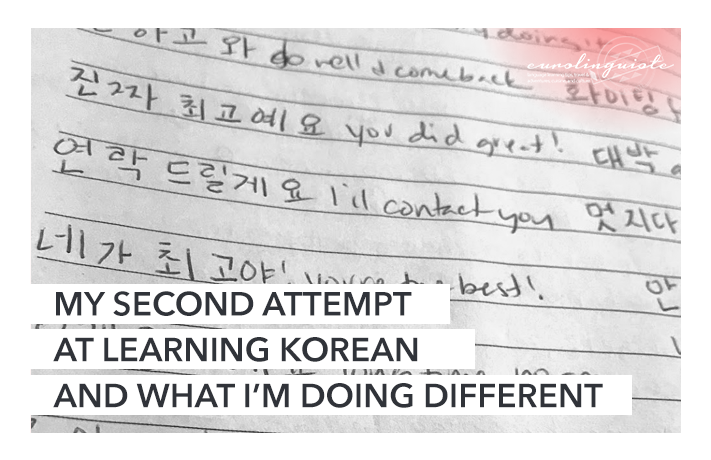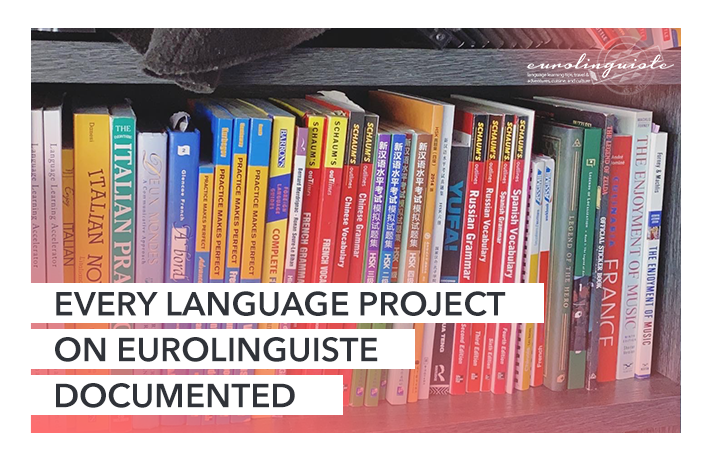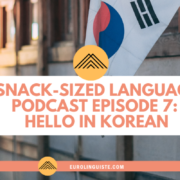So We Meet Again… My Second Attempt to Learn Korean & What I’m Doing Different

My name is Shannon Kennedy and I'm the language lover,…
I recently announced that I am revising a language that I studied in the past – Korean.
My first time around with Korean was a struggle. At the time, I was between Japanese and Korean as my next language project, but when my good friend Lindsay of Lindsay Does Language expressed interest in learning Korean alongside me, I chose Korean over Japanese.
During those six months, I struggled with almost every aspect of the language – the pronunciation, the writing system, the grammar, and nothing seemed to stick. When Lindsay told me she was ready to move on to other language projects, I decided to set Korean aside. I planned to use the time to think about what I wanted to do about Korean – tackle it again or give it up.
Getting Re-Started with the Korean Language
Initially, I was certain that I would end up giving up Korean. It seemed as though the language and might not have been a good fit, so I spent a year working on several other languages, including a few new ones. It gave me the chance to experience a couple of big language learning wins and remind myself that just because I wasn’t able to learn Korean, I wasn’t a bad language learner.
I started trying to convince myself to let Korean go. I had already done it with German and Arabic, so doing it again shouldn’t have been hard. But there was just something about the language that led me to feel as though I should hang on to it. I couldn’t make a decision.
Recently, I started learning Japanese – a language that is often compared to Korean in terms of difficulty. My experience with Japanese wasn’t anything like my experience with Korean. I poured over my notes from my time with Korean, trying to figure out why — and then it hit me.
When I started seriously studying Japanese, I began taking lessons almost right away. When I studied Korean – I did all of the same things except lessons. I never really used the language with someone else. Instead, I convinced myself that my weekly meetings with my study buddy (which were in English) were enough. And while they kept me accountable and helped me find the motivation to study every day, everything that I learned was relatively meaningless because I wasn’t putting it into practice.
So I decided to give the language a second chance and to do it “right” this time. I’d do exchanges, take lessons, and start speaking the language sooner rather than later.
My Early Efforts at Learning Korean Weren’t For Nothing
To be completely honest, I was worried that the first six months I spent studying Korean were a total waste. Outside of a few basic expressions – hello, thank you, and goodbye – I remembered nothing. All the vocabulary, grammar, and practice I had done disappeared the moment I stopped studying the language.
I was convinced that everything that I had learned was gone – that I really didn’t remember any of it.
But when I started back up with the language, it quickly came back. Things made sense much more quickly and I often found myself thinking, “oh yeah, I remember that.” The information was still there in my head – it was just buried.
And not only was it still there, but it also helped me to pick up new concepts and vocabulary much faster than I had in the past.
Tackling the Korean Writing System
When I first started studying Korean, I remember spending countless hours on Memrise trying to learn the alphabet. But no matter how often I reviewed the characters, it seemed like I couldn’t piece it all together. When I decided to start over, the first thing I returned to was that particular Memrise set. I reset my learning statistics and began studying from zero.
Memorizing the Korean writing system was suddenly as easy as other learners always claimed it to be. Yes, I still struggle with the more complex vowel sounds (particularly those with w), but after only a few hours, I could sound out entire words and phrases in Korean even if I couldn’t understand them.
The Conversational Approach to Language Learning
As I said before, using Korean is very important to me this time around. When I studied the language before, I did try to use the language whenever I went to the doctor. I thought it made sense, but looking back, I realize that it really didn’t. My doctor appointments were important and it didn’t make sense to try to use Korean in them when I needed to have important discussions with my nurse and doctor. It also didn’t make sense because what I needed to know in that particular setting wasn’t useful to me at all in any other setting.
This time, I’m diving right in with tutors and exchange partners and I’m going to try to record more videos on Instagram – much like I did with Japanese.
The Resources I Plan to Use to Learn Korean
To start, I am using Memrise to pick up new vocabulary and keep the writing system in front of me. It’s my go-to resource for every language because I can customize my own decks (I add new words to my private deck after lessons) and study pre-made flashcards. I always have it with me since it’s loaded on my phone, so I can study anytime, anyplace. I’ve also found the Memrise Korean course (the course that Memrise itself makes for the language) to be extremely useful
From there, I plan Korean Made Simple as my first course book and Pimsleur as my first audio program.
Eventually, I’ll add Assimil into the mix for both its book and its audio. On the side, I’m watching the Easy Languages Korean episodes as well as some of the KoreanClass101 video lessons. I’ve also had my first few lessons on iTalki.
To Sum Up
Much like with Japanese, I have a few different resources I’m interested in trying out, but as I’ve mentioned before, I don’t like to work with more than 3-5 language learning resources at any given time. It gets overwhelming and I find I’m not able to make as much progress when I study. As a part of the Fi3M Bootcamp (and just for my own records), I plan to make regular videos on Instagram and Youtube– so be sure to follow me there.
In the meantime, if you have any tips for me as a newish Korean language learner or if you have any resource recommendations that you couldn’t have lived without, please let me know in the comments below.
I look forward to hearing from you!
My name is Shannon Kennedy and I'm the language lover, traveler, and foodie behind Eurolinguiste. I'm also the Head Coach of the Fluent in 3 Months Bootcamp, co-founder of Women in Language, and former Resident Polyglot at Drops.






